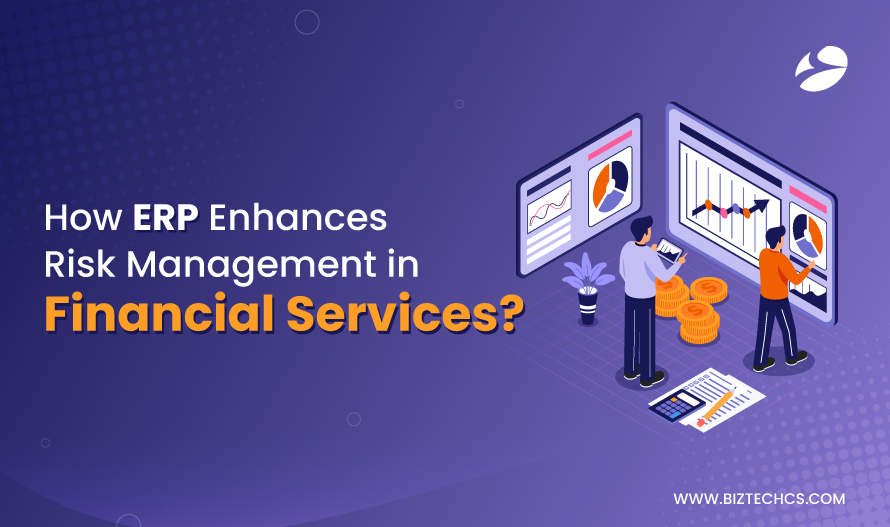1955
How ERP Enhances Risk Management in Financial Services?
24 Oct, 2024
5 min read
1955
24 Oct, 2024
5 min read
Table of Content

Risk management is very important in the financial service industry. With the emergence of technologies, ERP systems are proving to be necessary tools for this.
ERP for finance is used for process optimization, data accuracy increase and decision-making. Gartner studies show that companies using ERP systems reduce operational risks by 30%.
It also enhances compliance with regulations and reduces financial loss. Given the escalating complexity within the financial services sector, ERP intervenes to help recognize potential risks at an early stage.
In this blog, you will learn about ERP’s role in improving risk management in the financial services industry and why it is becoming a mandatory tool for any financial services company.
Risk management is of great importance in financial services to avoid situations that will lead to losses and instability.
It includes risks which include issues of market risk judgment, credit risk, and operational risks.
Market risk is positioned as the greatest threat in 60% of financial institutions in the opinion of Deloitte.
Appropriate risk management enables firms to minimize severe losses during the occurrence of a disaster, like the 2008 financial disaster. Some of the measures include; diversifying and periodically running through stress tests.
The inability to address risks culminates in dangerous results such as huge penalties or business closures. Even in 2021 solely, the Breaches cost the American banks $15 billion in fines.
ERP informs risk management since it offers accurate and up-to-date information. When data is centralized, it becomes easier to identify some emerging risks that organizations should avoid, especially due to their negative impact.
Implementing ERP systems means that there will be more control over the financial transactions conducted in organizations, thus minimizing the occurrence of fraud.
They assist in monitoring compliance as all records are well-contained within the page. Features such as auto alerts within ERP systems inform the users when there are anomalies. This makes resolving any arising complications and problems easier since they have already been identified early enough.
Another way through which ERP systems allow the improvement of information security is through restricting access to specific data.
They provide comprehensive audit trails that enhance accountability. When it comes to risk forecasting, businesses can be ready for such risks before they occur. ERP enables businesses to manage risk efficiently by providing an overall view of operations.
Leveraging IT services for financial industry increases risk mitigation by increasing efficiency in data processing and report generation. This consolidation of data makes it easier to access in one instance and is beneficial since the data is correct.
Due to real-time reporting, one can make the decisions in good time and avoid risking the enterprise most of the time.
Financial regulations are also followed as the system automates reports and provides consistent data processes that need to be followed. This eliminates cases where a lot of time is consumed in managing compliance issues, with minimal mistakes.
In short, ERP enhances risk management decision-making by offering accurate and real-time information to managers.
Risk control is improved for the financial services industry by centralizing processes when implementing ERP.
They find it helpful in tracking diverse financial risks, including credit, market, and operational risks in one system.
Alerts from the ERP system can detect and manage risks early in a business organization. This early warning helps minimize the chances of bigger financial problems.
ERP also provides tools to consider a vision of the future and to execute stress testing, which is another advantage that assists companies in being ready to face unpredictability.
Overall, it enhances the efficacy of decisions and the balance-sheets stability by providing more effective risk management.
The advantages of risk management in financial services with the help of ERP system implementation are evident.
This minimizes human errors while at the same time reducing the amount of operational costs incurred while performing risk tasks. This results in financial processes being more efficient due to the enhancement and elimination of wasteful stages.
This minimizes time wasted on paperwork and manual work, thus enhancing efficiency. The system also offers a holistic picture of risks, enabling efficient resource distribution within an organization.
In this case, companies should be in a position to plan their resources well so that resources are put in the proper places and not wasted. ERP assists in risk management and sustains the organization’s efficiency, and reduces costs.
Implementing an ERP system for risk management in financial services offers key benefits. It helps to produce a clear audit trail, which allows the tracing of all financial operations and any kind of risk activities. This is helpful in internal and external auditing since it will help to offer records.
It also introduces enhanced governance, which means that roles and responsibilities are clearly described, hence fortifying the risk management frameworks. This system increases regulatory reporting ease since the consolidated data attained is also standardized throughout the organization.
This minimizes mistakes and helps compliance with regulations in a better way than being done on one hand. In general, the implementation of ERP enhances control and enhances the level of transparency in the management of risks in financial services.
The adoption of ERP systems in financial services reduces risk through the generation of real-time risk dashboards. This provides management with a single point of reference that highlights the company’s risk metrics and financial performance.
Another way that planning ahead is beneficial is through the usage of predictive analytics tools in ERP systems; by identifying possible risks before they occur, firms can mitigate risks early on.
With KRIs, the system allows for ongoing risk evaluations to enhance decision-making. These indices assist firms in developing better risk management solutions based on quantitative data analysis.
Risks are generally more controlled and visible in ERP systems, meaning they can be managed much more proactively.
Adopting ERP in financial services enhances risk management because all operations are comprehensively described and accounted for.
As everything is interconnected, it becomes easier to identify risks for the decision-makers based on the departmental displays.
Another benefit of ERP systems is that they provide real-time accurate data, which enables decision-makers who are faced with the challenge of making a quick decision without necessarily having to wait for a consultant to get back to them with fresh data.
This results in efficient management of an organization’s financial and operational risks. It also points to the system’s capability to support long-term planning since risk data is in sync with business objectives.
Altogether, ERP enhances decision-making and facilitates the management of risks for companies.
Implementing ERP in financial services improves risk management by enhancing forecasting capabilities.
By utilizing ERP, firms can execute scenario and sensitivity analyses to foresee unfavourable market circumstances worthy of planning.
Budgeting within the system also enables entrepreneurs to forecast possible losses and market changes, thus monitoring all risks.
Another real advantage of implementing the ERP is the capability to manage liquidity based on the system’s indicators and possible shortfalls in liquidity.
It means that firms can forecast their position so that they can have capital ready adequate enough to help pay for dues. ERP systems can generally be regarded as a preventive measure for managing financial risks.
In financial services, ERP systems are very influential in improving risk management. They offer real-time information to assist in recognizing and controlling risks on time.
Reducing human intervention leads to less risk since every detail is already processed by equipment. This way, especially through improved transparency and reporting information, decision-makers can act confidently. Also, it is easier to deal with a business’s obligatory regulation requirements.
Our ERP finance system provides them to meet the risk management needs for your financial organization. Moreover, our team can configure the system with your unique requirements, so you never fall behind risks.

Artificial Intelligence (AI)
222
By Devik Gondaliya
27 Aug, 2025

Odoo
1033
By Uttam Jain
18 Aug, 2025

Artificial Intelligence (AI)
987
By Devik Gondaliya
14 Aug, 2025